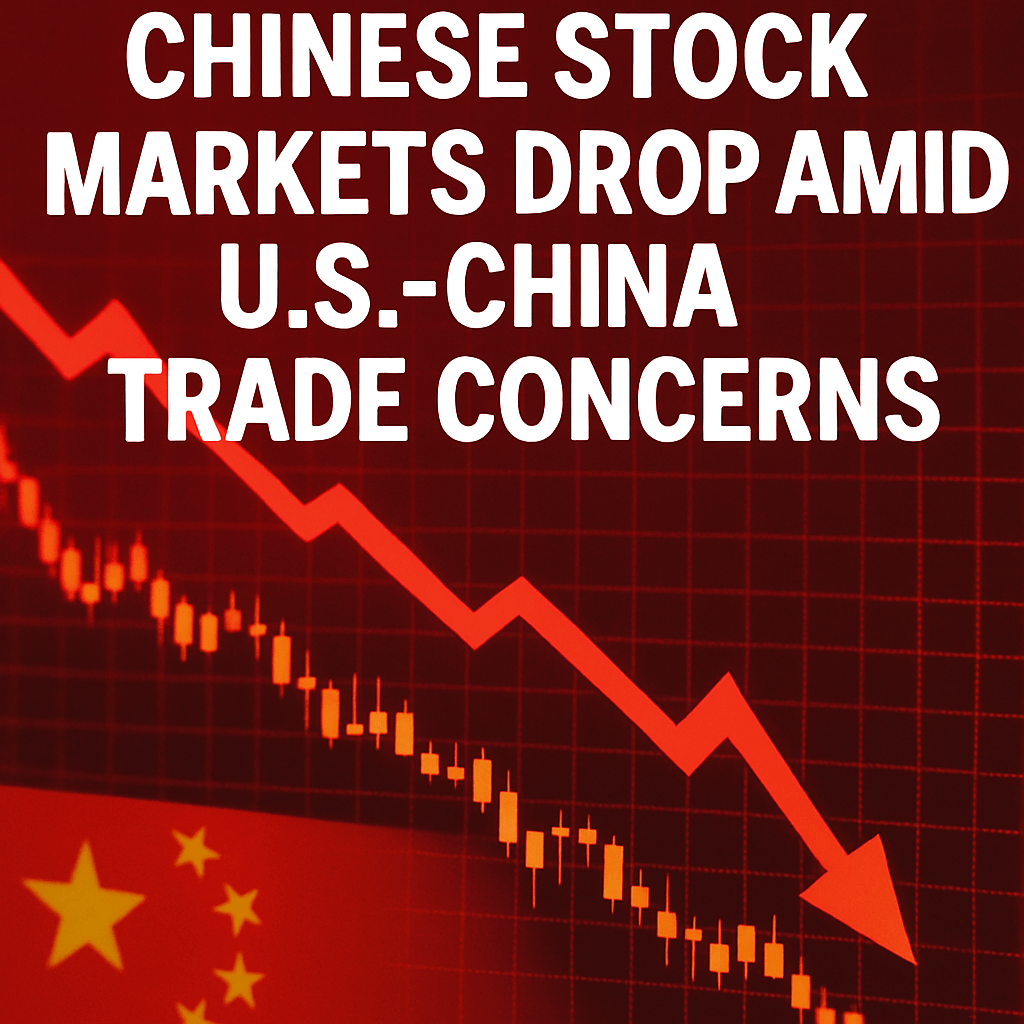Chinese Stock Markets Drop Amid U.S.-China Trade Concerns

Chinese shares experienced a downturn on Monday following U.S. President Donald Trump’s remarks that reignited trade tensions, posing a threat to the fragile truce established after negotiations in Geneva last month. The escalating rhetoric comes as the global economy remains sensitive to the intricacies of U.S.-China trade relations.
Market Reactions
Hong Kong’s Hang Seng Index, a barometer for the performance of companies traded in the city, fell approximately 0.6% on Monday. It is noteworthy that markets in mainland China were closed due to the observance of the Dragon Boat Festival. This closure prevented immediate reactions from mainland investors who may have been impacted by the President’s statements.
Trump’s Allegations Against Beijing
In a statement made on Friday, Trump asserted that Beijing had “totally violated” its commitments under the mutually agreed framework to suspend most tariffs for three months, allowing for ongoing trade negotiations. This unilateral accusation highlights the critical role that communication plays in international trade negotiations.
“China firmly rejects these unreasonable accusations,”
stated the country’s commerce ministry, further criticizing recent U.S. actions as “discriminatory restrictive measures” that contradict the spirit of the Geneva discussions.
Tariff Tensions and Rare Earth Metals
The U.S. administration has cited rare earth exports as a significant point of contention between the two countries. Rare earth metals are crucial in various industries, including semiconductors, electronics, and military technology. Recently, Beijing enforced tighter export controls on these materials as part of its retaliatory measures, leading to concerns that these actions could further complicate the Global Supply Chain.
U.S. Trade Representative Jamieson Greer emphasized in a televised interview that China is allegedly “slow down and choke off” the export of these essential minerals. This assertion illustrates the heightened sensitivity surrounding the supply chain and the balancing act necessary to maintain technological and economic competitiveness.
Accusations of Non-compliance
On the flip side, Beijing argues that Washington hasn’t lived up to its end of the agreement either. Following U.S. claims that utilizing Huawei’s AI chips might violate established export controls, Beijing expressed discontent, asserting this suggestion undermines the consensus reached in Geneva. Concurrently, the U.S. has reportedly extended its own export restrictions, now encompassing high-tech goods like chip control software and aviation gear.
Moreover, there have been threats from the Trump administration to revoke visas for Chinese students studying in the U.S. if they are affiliated with the Chinese Communist Party or engaged in sensitive sectors. Such measures underscore the multilayered nature of current U.S.-China relations, affecting not only trade but also educational and technological exchanges.
Global Market Implications
The S&P 500 futures index reflected a reduction of 0.5% as of 4:30 am Eastern Time, while the STOXX Europe 600 index noted a drop of 0.2%. The implications of these moves are poised to affect investors globally, as U.S. and European indices react to the spiking tensions with Asia.
In Japan, the Nikkei 225 index also saw a decline of 1.3% due to cautious remarks from local officials regarding their own trade negotiations with the U.S. Observers are acutely aware that Tokyo’s fate could hinge on Washington’s approach, particularly concerning automotive tariffs, as Japanese negotiators insist a deal is contingent upon U.S. concessions.
Future Outlook of U.S.-China Trade Relations
With the 90-day moratorium on tariffs set to expire on July 9, a sense of urgency is palpable in the markets. If the Trump administration chooses not to extend this pause, Japan could face a staggering 24% tariff on its exports to the U.S. indicating a dire need for resolution.
Commerce Secretary Howard Lutnick indicated on Sunday that he did not foresee an extension of the current tariff pause. This sentiment is echoed by concerns regarding the unpredictable nature of the Trump administration, which has a history of abruptly altering trade policies, as evidenced by previous threats to impose tariffs on the European Union.
Legal Uncertainty and Future Tariffs
Adding to the uncertainty, U.S. courts are currently navigating the legality of Trump’s tariffs. A recent ruling concluded that Trump overstepped his legal boundaries with his “Liberation Day” tariffs; however, an appeals court has temporarily allowed these tariffs to persist as deliberations proceed. Meanwhile, President Trump pledged to raise steel tariffs to 50% starting June 4 during a rally, signaling that further tariff escalations may soon become a reality.
Regional Market Reactions
- South Korea’s KOSPI index remained relatively flat.
- Australia’s S&P/ASX 200 index decreased by only 0.2%.
- India’s NIFTY 50 also reported a modest decline of 0.2% as of 4:30 am Eastern Time.
Despite regional volatility due to trade tensions, some Asian markets appear resilient, suggesting a complex backdrop to these developments.
Conclusion
The trajectory of U.S.-China relations remains fraught with uncertainty, particularly as both nations grapple with critical trade negotiations marked by tariffs, legal disputes, and geopolitical maneuvering. Investors must navigate these complexities with caution while maintaining awareness of the broader global economic implications.
Source: fortune